Introduction
In January 2023, VICE news reported on a Telegram channel dedicated to sharing white supremacist homeschooling curricula with other like minded parents. Run by a pair of neo-Nazi parents based in Ohio, the Telegram channel featured worksheets and advice advocating for Nazism. In the public outroar that followed, some noted that existing US homeschooling laws make such curricula “likely legal” in most US states. Several Ohio lawmakers weighed in, and Representative Casey Weinstein (OH-34) called for “more regulations around homeschooling here in Ohio.”
The debate around the means and degree of state oversight for homeschooling long predates this incident. Some have raised concerns about the historical instances of pro-segregationist parents homeschooling their children as a way to bypass racially-integrated schools, and how that impacts the well-being of the child and the broader community. Others have criticised the uneven and unclear standards of government oversight, and how that may impact “educational standards or safeguards against abuse” for children. Yet, others have claimed potential risks of extremist parents exploiting homeschooling as a way to socially isolate and radicalise their children.
This Insight examines narratives and educational curricula shared on Gab, a popular alternative technology (alt-tech) platform known for its minimal content moderation and popularity among extreme right users. From December 2022 to April 2023, I examined the dominant narratives shared in the three most populous public Gab homeschooling groups (the groups’ names have been omitted to avoid amplification). I observe that these groups, though not overtly extremist, serve as key avenues for users to spread mis-, dis-, and malinformation (MDM) narratives as well as white and Christian supremacist values. Importantly, this Insight does not seek to debate the merits of homeschooling or homeschooling regulations in the US; in all of its diverse applications, homeschooling is an accepted, valid, and important educational option. Instead, this piece is intended to provide a foundation for an informed conversation around how the digital mobilisation of homeschooling parents, connected on extreme alt-tech platforms and bound by shared extremist ideological grievances, can create virtual communities of practice that spread harmful MDM narratives and extremist ideas.
Homeschooling on Gab
In 2023, Gab’s CEO and founder Andrew Torba announced three new focus areas for the company: Homeschooling, Homesteading, and Homemaking (Fig.1). These focus areas were presented as the three pillars of Torba’s continued efforts to expand the “parallel Christian economy”, which describes his vision for a Christian-run and Christian-specific digital space. Eager to separate from “the corrupt American kingdom and its wicked culture”, the parallel Christian economy reflects Torba’s desire to limit the use of goods and services sourced from mainstream spaces. Torba and various high-profile Gab users have touted homeschooling as the preferred educational option; by separating children from the mainstream secular public school system, homeschooling parents are portrayed as thoughtful and faithful advocates of the parallel Christian economy.
This desire for homeschooling draws on the American extreme right’s long and contentious history with the US public education system, especially on cultural flashpoints such as racial integration, school-mandated prayers, science curriculum design, and sex education. In recent years, extreme right parents have coalesced around their displeasure towards a perceived ‘woke’ public school system. This trend runs parallel to the growing ‘parents’ rights movement’, which has mobilised parents across the US to protest school vaccination mandates, challenge how certain topics are taught in schools (e.g., slavery, the Holocaust), and spread unfounded allegations of public schools teaching ‘woke’ concepts such as ‘critical race theory’ and ‘the LGBTQ+ agenda’. While the parents’ rights groups movement even found support from some mainstream conservative politicians, homeschooling remains an attractive option for many extreme right parents.
To that end, Gab’s leadership is not wholly responsible for driving Gab’s flourishing homeschooling culture. As Catherine Tebaldi points out in ‘Alt-Education‘, homeschooling (especially religious homeschooling) has deep roots in the broader American extreme right space. Regardless, shown by its numerous homeschooling groups, discussion boards, and homeschooling-focused influencers, Gab’s active online homeschooling communities demonstrate the extent to which homeschooling is embraced by users while providing company leadership an avenue to advance Christian nationalist and other harmful narratives.
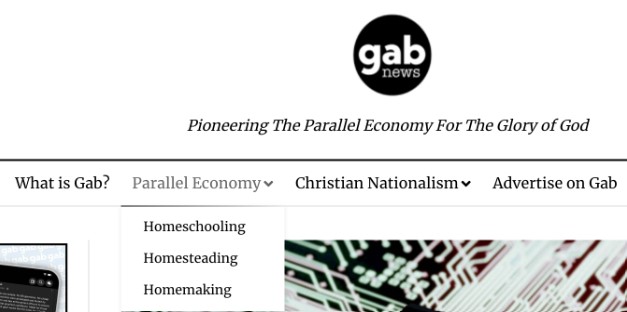
Fig.1: A screenshot of Gab News and the three tenants of the Christian Parallel Economy
Gab’s homeschooling influencer and publishing network boasts considerable reach. Populated primarily by homeschooling influencers, curricula provider companies, and non-influencer parents, this broader community is not a ‘made by extremists for extremists’ space, à la the Ohio neo-Nazi Telegram channel. Most community members do not appear to self-identify with an extremist ideology, let alone seek to recruit members into extremist groups. Nevertheless, the MDM and extremist narratives spread in this space demonstrate how the main objective of this community of practice — creating support and guidance for homeschooling families — can dually serve as a conduit for harmful worldviews to flourish based on shared values, political grievances, and concern for their children’s wellbeing.
‘Government Schools’: Using MDM Narratives to Attack Public Schools
This community’s defence of homeschooling is often expressed through harsh denunciation of public schools. Although some users reject public schools on the grounds of potential bullying or desire for more customisable curricula, many users convey their anti-public school stance through harmful MDM. Users respond to perceived and real accusations of homeschoolers indoctrinating children by making similar accusations against public schools. Regularly branded as ‘government schools’ created to facilitate ‘government indoctrination’ of children, Gab users in this community routinely accuse public schools of teaching ‘woke ideology’ in the classroom. Though exact definitions of ‘wokeness’ differ, community discussions broadly interpret wokeness as a worldview that champions Communism, Critical Race Theory, aggressive promotion of an LGBTQ+ ‘agenda’, and ‘anti-white’ sentiments. Some members also use antisemitic terms such as ‘ziocons’ and ‘Jewish cabal’ to further the unfounded conspiracy theory that public schools are controlled by shadowy organisations.
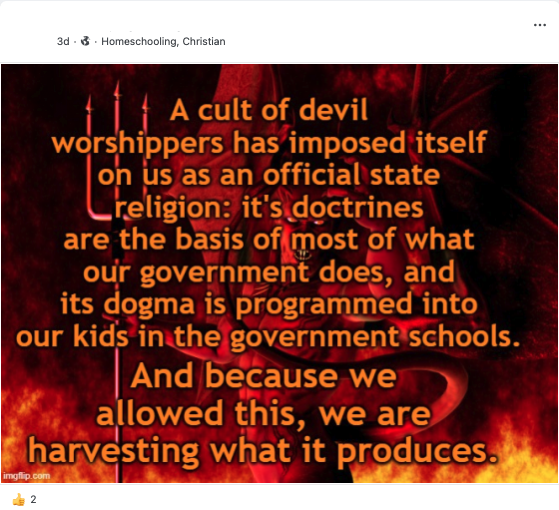
Fig.2: Users draw on the government school designation of public schools to falsely allege that children are being indoctrinated by an array of nefarious forces ranging from ‘Communist school officials’ to Satan.
In cases where users further elaborate on their view of the public school ‘woke’ ideology, discussions around gender and sexuality feature especially prominently. From claiming that schools “are teaching kids how to be gay” to making tongue-in-cheek claims of children’s books featuring “P is for pride…[and] transgender interracial cartoon parents,” large sections of this community believe that the US government is using public schools to “indoctrinate” children into supporting (or even joining) the LGBTQ+ community. Community members associate the LGBTQ+ community with moral and sexual deviancy, and put forth stories of drag queens reading at libraries or students undergoing gender-affirming surgery as ‘proof’ of alleged woke indoctrination. Some users also peddle fears of sexual abuse by ‘groomer’ public school employees, a term now widely associated in extreme right spaces with anti-LGBTQ+ sentiment. Frequently appropriated and weaponised to “falsely imply or claim that members of the LGBTQ+ community are pedophiles,” the groomer MDM narrative shared in this space further perpetuates homophobia and transphobia, as well as negates the validity of the public education system.
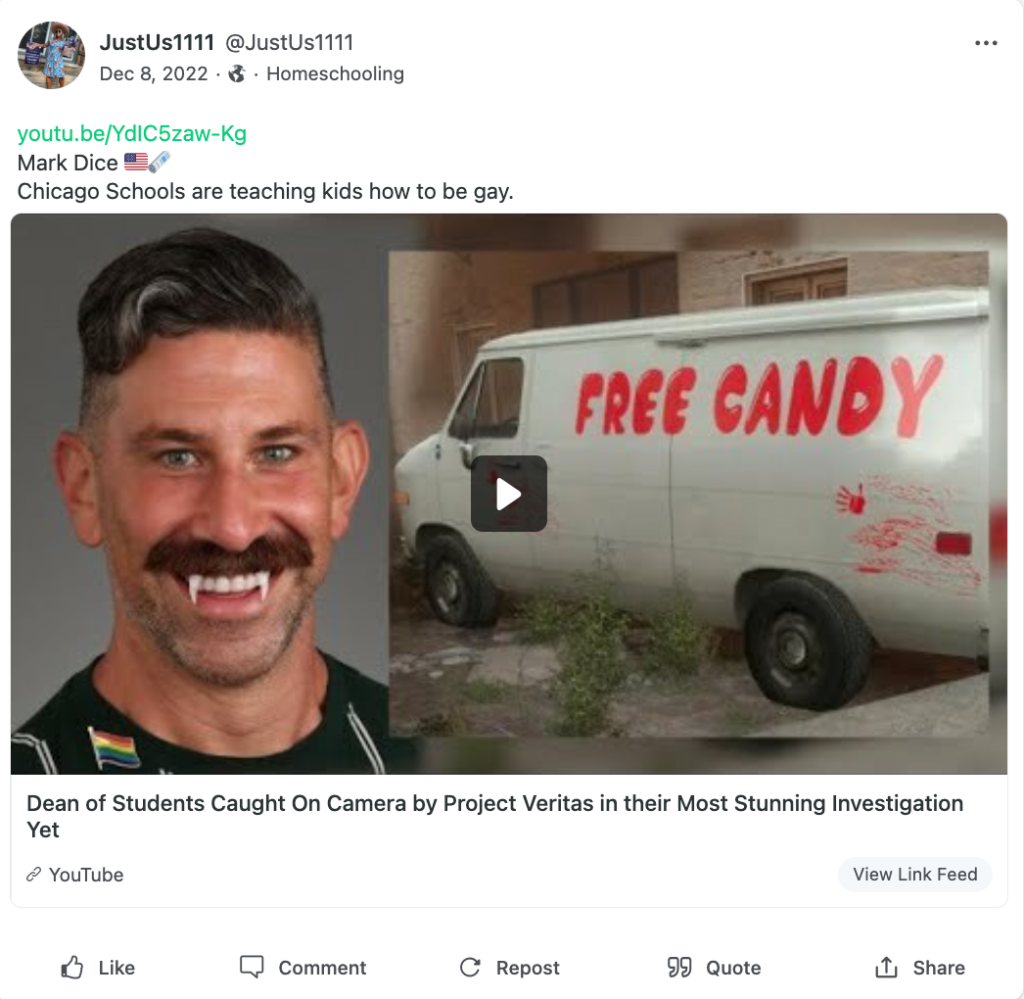
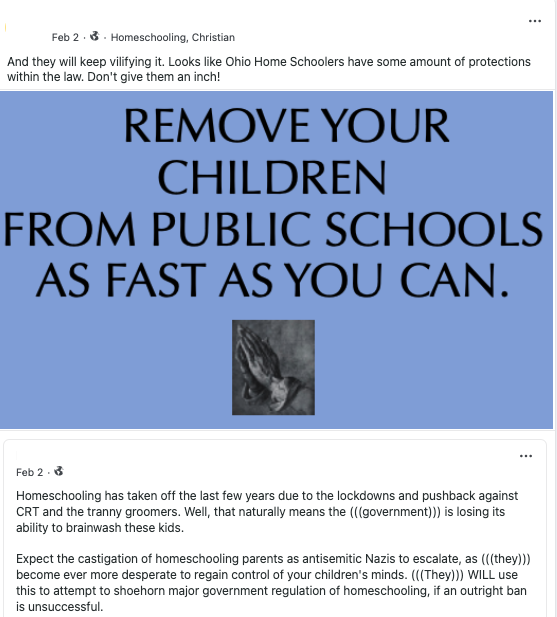
Fig.3 & 4: Allegations of the ‘woke’ public school curriculum furthering an LGBTQ+ ‘agenda’, members also spread various MDM narratives that defame and attack the LGBTQ+ community.
Classical, Christian, & Usually White: Reproducing White and Christian Supremacisms
Some homeschooling parents create their own curricula and share self-made educational resources on their Gab profiles and linked blogs. Most parents in this community, however, look to established homeschooling curriculum providers for guidance. Examining over fifteen providers mentioned by users during the observation period, the promise of a ‘Classical Christian education’ to teach children about ‘Western Civilisation’ appears frequently. Close analysis of these providers’ mission statements and humanities curricula in particular shed light on a deeply Christian and white-centric — and oftentimes outright white supremacist — content.
The reading list comprises of nearly all-white and European reading list, and reflect the enduring mainstream understanding of ‘The Classics’ and the Western literary canon that dominates various academic disciplines. What sparks greater concern, however, is the social context in which these curricula are shared, and the objectives associated with the histories and literature that they choose to privilege.
In defining the conditions of a classical education, these curriculum providers explicitly state that they center, if not exclusively teach, ‘Western Civilisation’. Although the study of Western European communities (however defined) is not inherently problematic, these curriculum providers’ descriptions of it suggest it to be coded language for white supremacist renderings of Western European history. The all-white and European readings list — when observed alongside lesson plans, textbook illustrations, and website design reminiscent of white traditionalist aesthetics — evoke thinly-veiled contours of a white supremacist curriculum. “Our books and curriculum materials emphasize the knowledge of the history of mankind and Western Civilization,” one publisher writes.
Other publishers are more overtly white supremacist. One online academy describes their company mission as providing “an alternative to the corrupt and antiwhite public education system”, with lesson topics that include “White Wellbeing – Awareness of Antiwhite Propaganda”, “Meet Your People”, and “The Great Westmen”. Another provider argues that their Classical Christian curriculum, composed almost entirely of white and/or Christian writers, is an effort “in opposition to the modern progressivists’ pedagogy designed to train compliant citizens”.
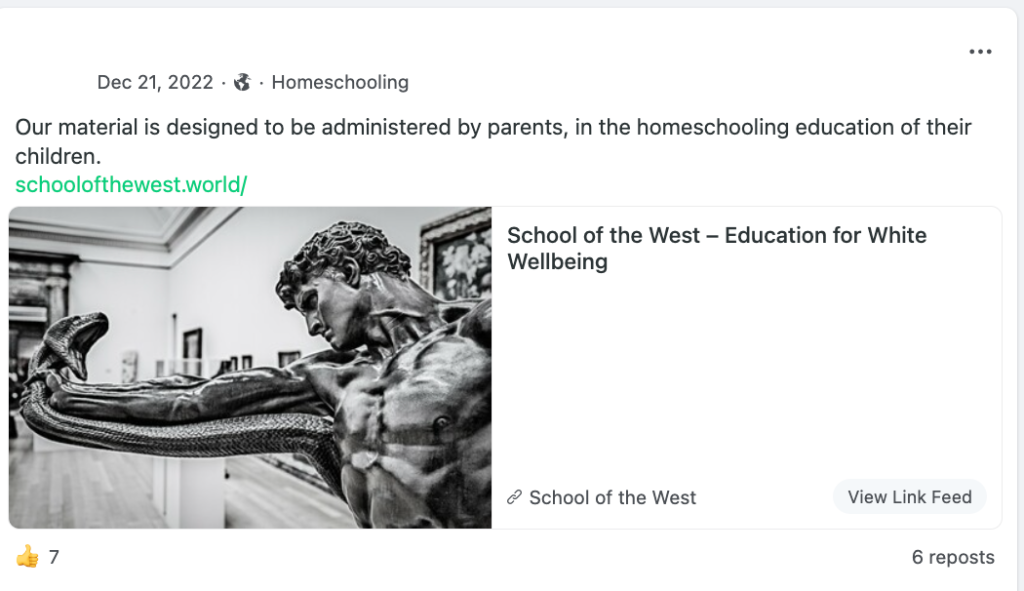
Fig.5: Though featured to a lesser extent that anti-‘woke’ and anti-LGBTQ+ MDM content, white supremacist memes and content are also present. Some also draw on well-known white supremacist aesthetics, such as Nazi posters and ancient Greek & Roman art that buttresses thinly-veiled white supremacist beliefs.
A white Christian supremacist leaning emerges when we see how curriculum providers conceive Western Civilisation in relation to their interpretation of Christianity. This is perhaps most clearly illuminated in providers’ ‘Great Book’ anthologies. A broad term for prominent works in the Western canon, curriculum providers position their curated list of the Great Books as “the means by which we pass on the cultural heritage of the Christian West”. Not only are non-white and non-Christian writers (with the notable exception of ancient Greek and Roman thinkers, who have been admired and co-opted by generations of white supremacists) regularly excluded, but we also observe an educational philosophy that rejects contemporary works as substantially inferior. This philosophy’s celebration of literature produced in the ‘olden days’ for its perceived intellectual superiority reflects a phenomenon that Catherine Tebaldi calls ‘digital traditionalism’, or the seemingly contradictory online honouring of pre-digital life in extreme right circles. For instance, a number of providers exclude books written after the early 20th century because, as one publisher argues, “the value of traditional history and a biblical worldview were still acknowledged and pursued” before that time. In addition to reading lists, faculty profiles of providers with tutoring services further suggest concerning intersections of white and Christian supremacist teachings. For example, one provider lists Stephen Wolfe, a prominent Christian nationalist who argued for the US to embrace Christian nationalism and become “more exclusive and ethnic-focused,” as a faculty member.
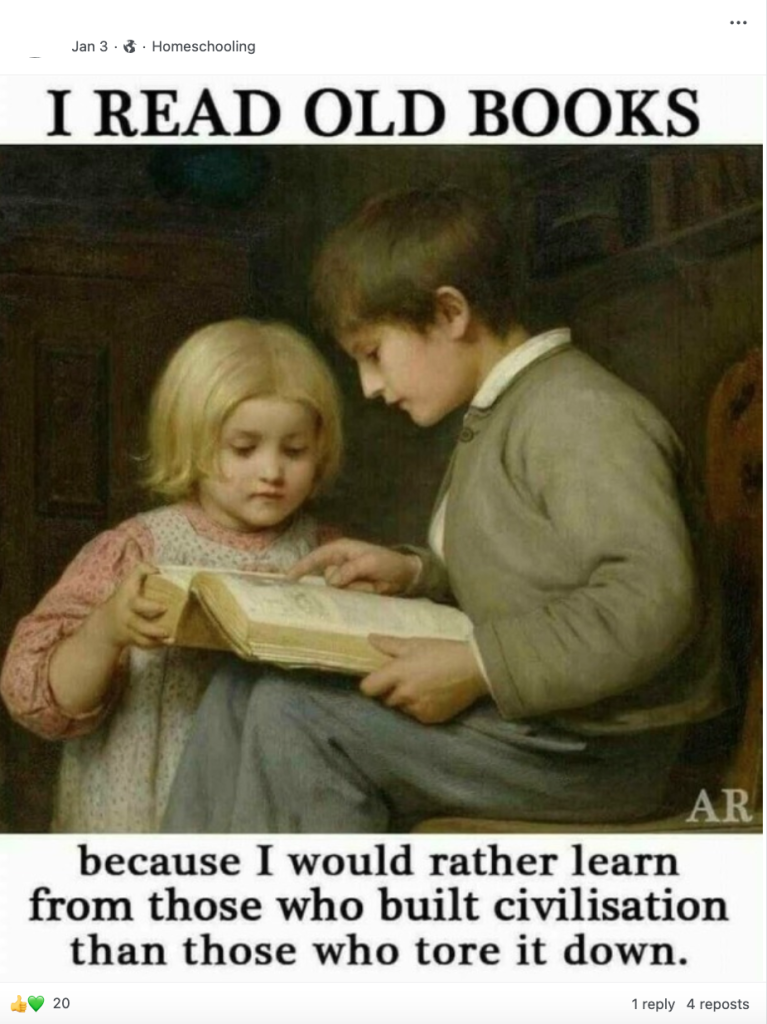
Fig.6: Emphasis on teaching ‘old’ literature is central to many curriculum providers featured in this space. Many members consider older works, especially those created before the early 20th century, as intellectually and morally superior.
Conclusion
The plethora of harmful MDM narratives and white Christian supremacist-leaning content spread in Gab homeschooling groups once again demonstrate how seemingly ‘non-extremist’ spaces can serve as effective conduits for harmful ideas. Empowered by Gab’s highly permissive environment, homeschooling group members circulate numerous harmful narratives in the name of protecting and educating children. And though there is a legitimate conversation to be had regarding explicit extremist affiliations and motivations (or the lack thereof) of community members, the conviction and ease with which users accept and share unfounded conspiracy theories and ‘Classical Christian’ curricula should be a point of concern for those monitoring the spread of MDM narratives online. As countless researchers and scholars of digital extremism have noted in the past, seemingly banal affinity groups have an immense ability to incubate and spread harmful narratives: this Insight seeks to add a small piece to this ongoing conversation. Further analysing the capability of ‘non-extremist’ digital groups to spread harmful narratives and extremist ideologies will prove key to enhancing and complicating our understanding of how supremacist, hateful, and destructive narratives reproduce online.
